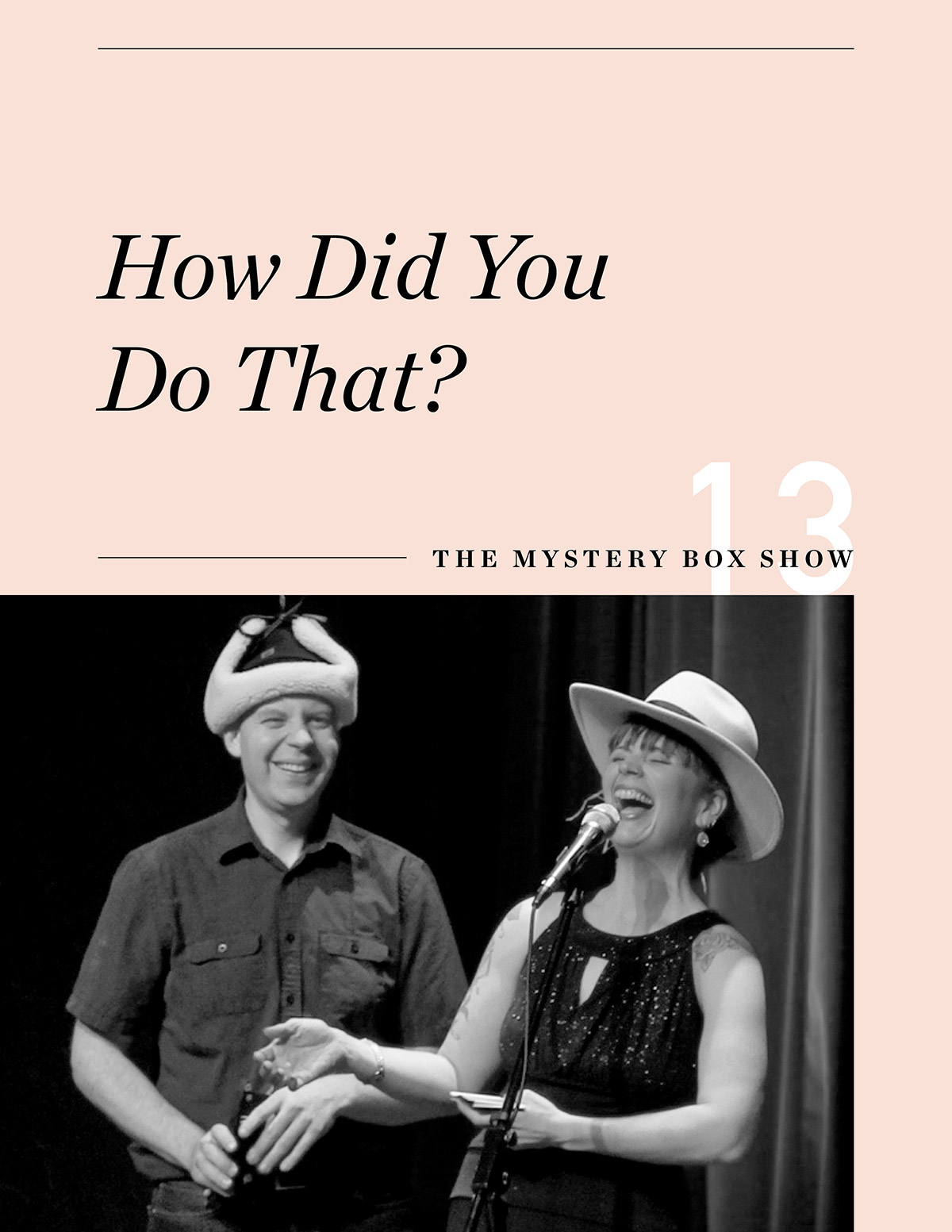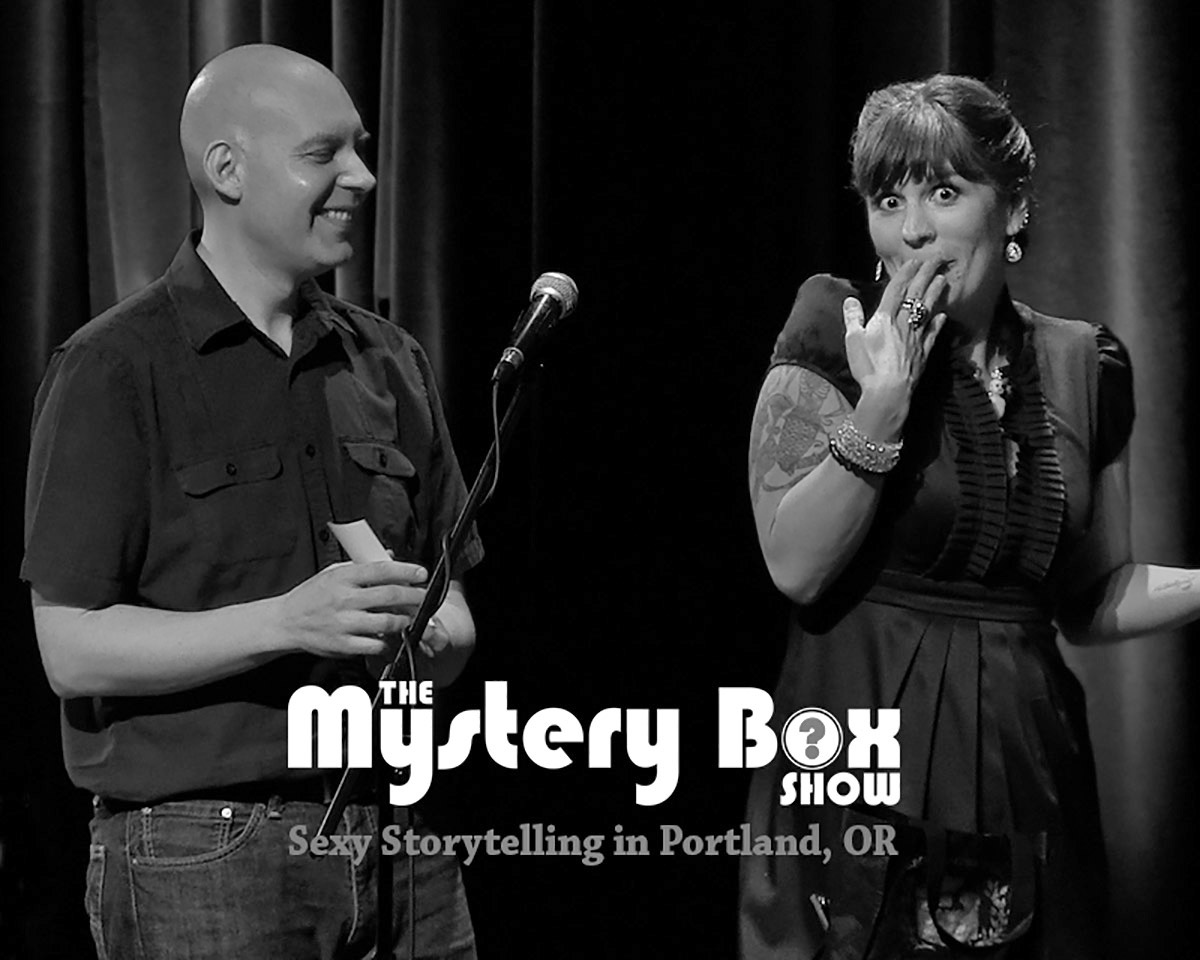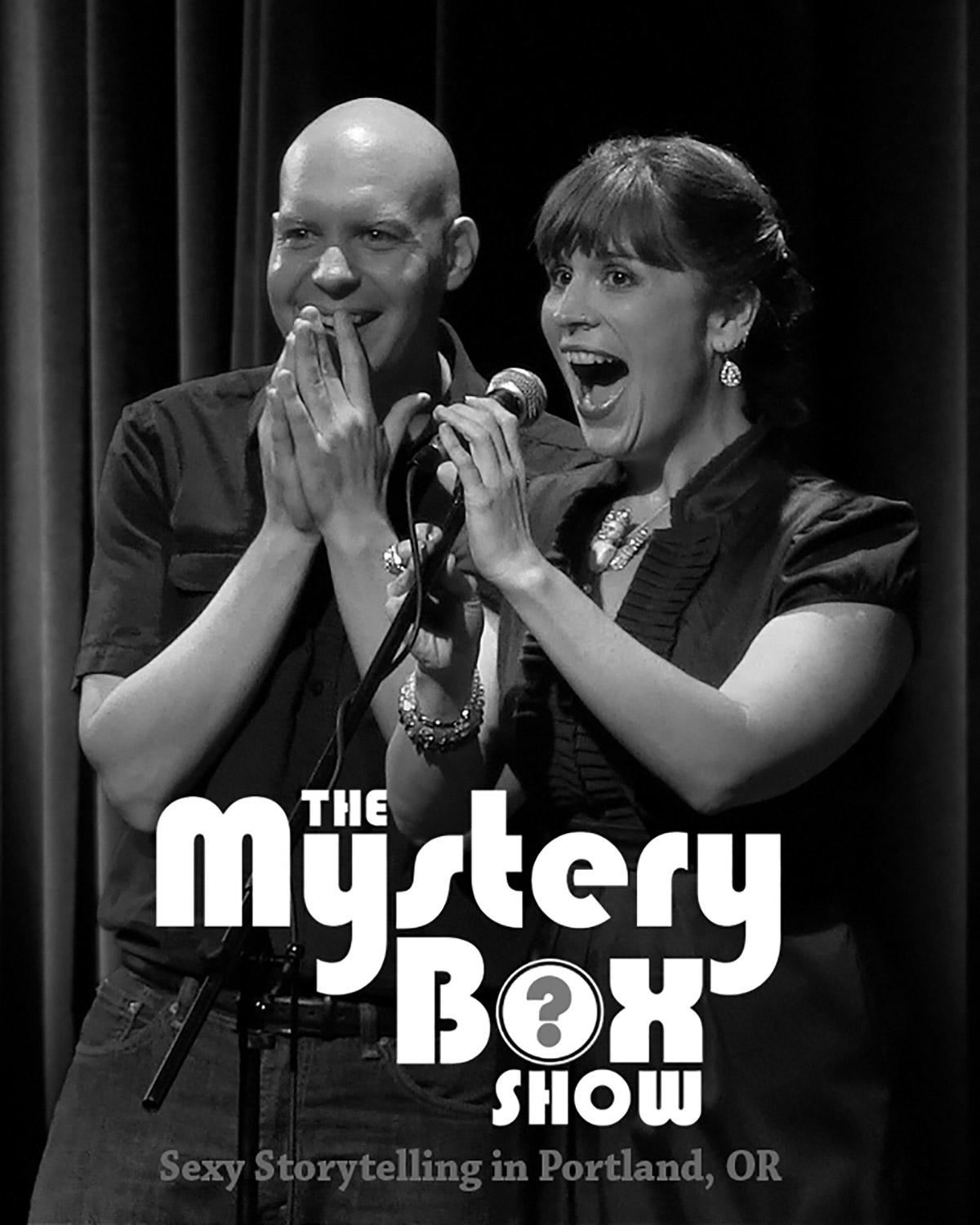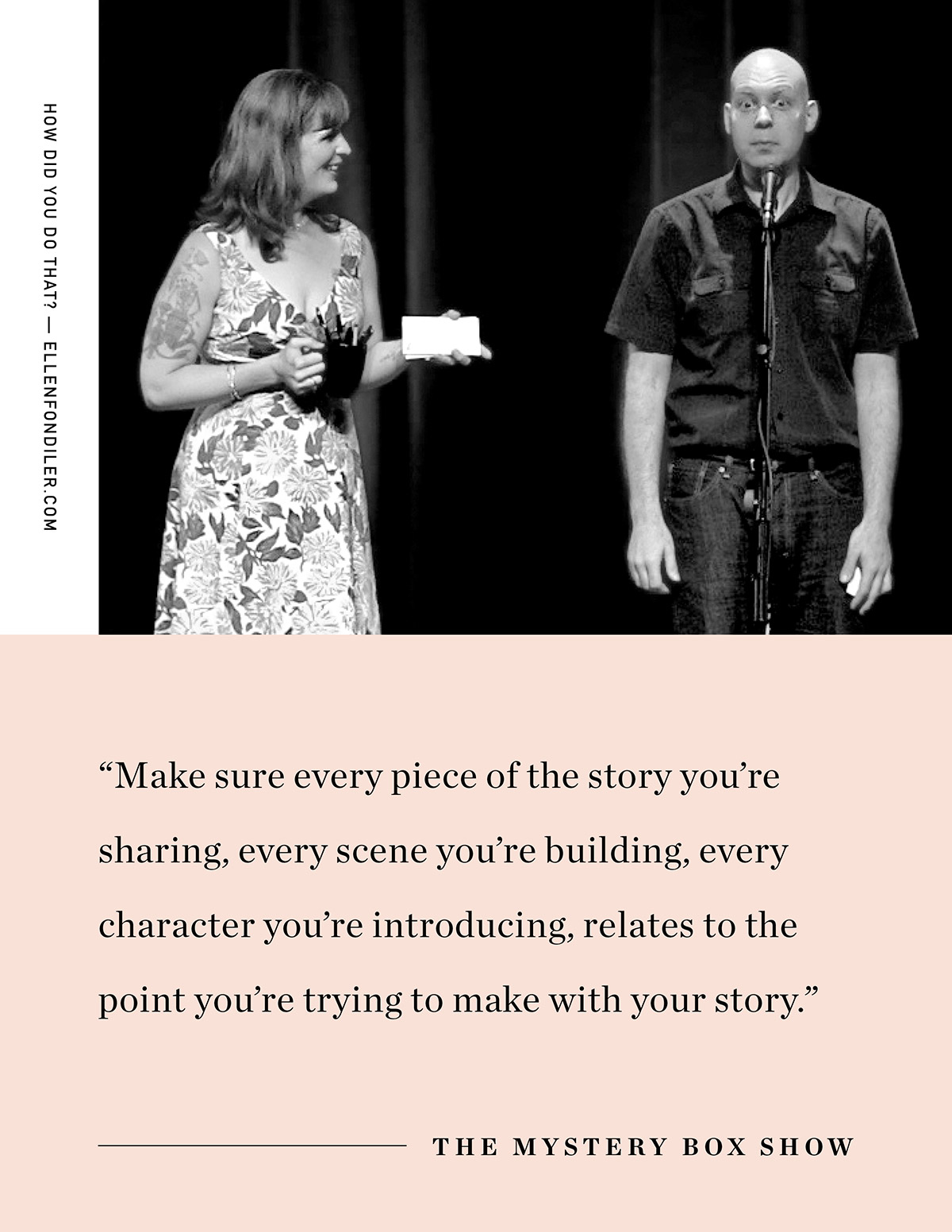
Whenever I meet someone who’s got a really cool job, who runs a thriving business, or who has completed an amazing project, I always want to know: “How did you do that?”
I’m always curious to hear the “behind-the-scenes story”—who they emailed, what they said, how they got their first client, how they got their foot in the door—the exact steps that they took to achieve their goal.
HOW DID YOU DO THAT? is an interview series where we get to hear the REAL story behind someone’s success—not the polished, neat and tidy version.
To see a complete list of all the interviews that have been completed to date, head over here.

Name: Eric Scheur and Reba Sparrow
Location: Portland, Oregon
Profession: The Mystery Box Show
You run a live storytelling event called The Mystery Box Show. It’s a show dedicated to true stories about sex and sexuality. People get onstage and share incredible stories from their lives. This show has become really popular, with lots of sponsors and about 400 people in the audience each time. How did this all start? Where did the idea come from?
ERIC & REBA: Like most ambitious projects, it’s probably helpful if you have a little bit of blind naiveté about exactly what you’re signing up for!
In the beginning it was just Eric, who didn’t have any experience putting on shows at all. He was just a fan of storytelling podcasts like Risk! and The Moth, and local storytelling shows as well. The simple fact is that he was always a little more interested when the stories turned to the topic of sex, and he thought it would be fun to see a show with only sex stories. He assumed one must already exist in Portland, but when he couldn’t find one, he started his own.
It’s true that the show has grown, but we started off small, in a wonderful and intimate improv space called The Brody Theatre. It only held about 98 people and was the perfect space for an experiment like this. Eric reached out to friends, and friends of friends, and posted on Craigslist to find anyone who would share their personal sex stories on stage—and then he coached each storyteller to refine their story. It was important that the stories were curated and polished so the night didn’t just become an evening of sexual bragging on stage. The stories needed a narrative structure, stakes, and if possible, a character arc.
The first show was a surprise sold-out success, and the audience asked “When’s the next one?!” So that meant we had to do more. It never occurred to Eric that it would be a regular thing, really. All of the energy went into making that first show.
We continued to pack the house almost every time we did a show, and the audience loved the stories and the storytellers. But things really began to grow when Reba came on board a year later. Reba brought a few key elements that the show had been needing: organization, structure, audience care (that’s a big one, deserving an essay in and of itself), and most importantly, emotions!
When Reba started coaching storytellers, she was able to use her background in theatre to dig into storytellers’ tales and really pull out the emotions that the audience connected with.
The change in the stories on stage was noticeable, and the audience related to the stories more than they ever had before. It wasn’t long until we had to look for a larger venue (again, all orchestrated by Reba), and then a larger venue still! Not bad for a show that didn’t think it would move past its first appearance.
Reba, after you came onboard as Executive Producer for the show, what did you want to change–and why? How did you evolve the show into what it is today?
REBA: It was clear that there was excitement at the shows. It was a small theatre and, honestly, when people are talking about sex in a compressed space, it’s going to create energy. These shows felt like a party, and that’s a great place to start from.
I tend to watch shows with the eyes of a producer. This probably comes from my background in theatre, and forensics before that. During the first few Mystery Box Shows I went to, I felt that the stories could have been more developed. They always ended before I’d heard everything I wanted to hear from them: things like “But how did that experience leave you feeling? What changed for you?” or “I didn’t see how this part of the story related to the other part of the story—that could have been strengthened.”
When Eric and I started coaching the storytellers together, I was able to ask those questions and the stories got richer. When we coach together, Eric is really good at helping to build the narrative structure, and I’m really good at digging for the deeper emotions in a story. It’s a combination that really works well together, but a lot of those deeper emotions weren’t as present at the first few shows.
The other thing I saw at the live show was that Eric was running himself thin trying to produce the show, host the show, prepare the green room, interact with the audience, and help the storytellers feel comfortable before going on stage. That’s a LOT for one person to do, and I don’t think even Eric realized how much he was trying to do at once. I knew that I could bring my experience of stage managing, which would give the show a more solid foundation.
The stuff that happens backstage before (and leading up to) the show is the foundation of what makes a show suffer or what makes a show great. What I saw was that the show needed more time focused on what happened BEFORE the night of the show: working with the storytellers, establishing the pace of the show, things like that.
It’s all very invisible. The show got tighter, better produced. But I don’t think that the audience would be able to point to a specific thing to say “Ah, this is why the show is better.” It’s just something that the audience walks away feeling.

Describe what the very first Mystery Box Show was like. Where did it happen? How did you feel (nervous, excited, both?) Did anybody show up to watch the show?
ERIC: At the very first show we had a packed house. That was a bit of a surprise, to be honest. A lot of those people were my friends, or friends of the storytellers, or people who probably saw an ad that said “sex” and thought, “Ooh, I’ll check that out!”
Interestingly, the second show was the one where only about half of the seats were filled. Who can say why? It definitely felt like a disappointment after the success of the first show. It’s funny, too, because if we’d been half-full for that first show, we would have considered it a runaway success! As the shows continued, audience numbers went up and down, but tended to trend towards getting larger and larger. Seems like a good lesson about perseverance?
Lots of people dream about starting a cool business or project, but they worry that “nobody will care” and “nobody will show up.” You have created a very enthusiastic following for The Mystery Box Show. Talk a little about how that happened. What are some of the specific things you’ve done to build excitement for your shows and sell tickets?
ERIC & REBA: It’ll sound cliché, but we’re putting on the show that we would want to go see. It feels like that’s probably a factor in why the show means something to people: because it means something to us and that resonates. The show has our voice and our aesthetic, which makes it personal. Much more personal than trying to figure out what people would want to see and then catering it to them. We cater the show to us and trust that the audience will find it matches with their tastes as well.
That’s not to say we don’t care about the audience. In fact, Reba is focused very intently on making sure the audience feels special, and this manifests itself in subtle ways throughout the live show, and even in our social media presence. Here are a few examples of things we consciously do, or consciously don’t do:
• We don’t lecture our audience. No telling them how they should feel about a certain story, or about their own relationship with sex, their insecurities, issues of shame, or displays of enthusiasm.
• We curate our stories to be relatable to just about everyone. While most of us have many, many, many different sexual experiences, the emotions tied to those experiences tend to be universal. A favorite example of this is that most of us probably can’t relate to the experience of having sex in a public sex club, surrounded by onlookers. But most of us can probably relate to issues of being comfortable with our bodies, and feeling judged because our bodies aren’t “perfect” according to cultural/media standards. When those emotions become the focus of the story, and the sex club becomes the mere circumstantial details, the audience feels invited in.
• We make sure that our show is an inclusive show. That is to say, everyone is welcome, and we make an effort for everyone to feel comfortable and safe. We’re not just here for kinky people, and not just for vanilla people. No gender expression, sexual orientation, or relationship model is seen as more special or righteous than any other. (This is our own interpretation of “being the change you want to see in the world.”)
We don’t have any charts or graphs that show how those kinds of things translate directly into ticket sales, but we know that it does make a difference.
What’s one of the most difficult things you’ve had to deal with? Has there ever been a setback that made you think, “Maybe we should stop doing this show,” or “This is just too hard.” What was that moment, and how did you get through it?
ERIC & REBA: Ooh, this is a good one! There’s actually been a new challenge in the last year and a half, as the show has grown: negative feedback.
In the early days, most of the response to the show was overwhelmingly positive. And to be fair, that overwhelmingly positive response is still there. But that positive response is now peppered with e-mails or Twitter reactions from people who have been offended by the stories at the show, or whose past trauma has been triggered by the subjects mentioned on stage.
This is a tough one for us, because while we honestly believe in the stories we put on stage (which showcase the range of human sexuality, and can occasionally go dark or extreme), we don’t want to make our audience feel unsafe.
We’re still working through the best way to make sure our audience feels good about the stories in the show, without compromising our vision of what we want the show to be. Our current method is to offer Trigger Warnings before each story that might have some obvious traumatic content such as sexual violence, non-consent, etc. The trouble is that just about anything, obvious or not, can trigger unpleasant emotions, depending on the person. There’s no real way to predict what will be difficult material for certain audience members. And there have been audience members who were not shy about speaking up in e-mail or on social media after having been exposed to material that put them in a darker space.
So we’re trying to find a balance that means we can both take care of our audience, but also still feature stories that exist all across the spectrum of sexual experiences. It’s not always easy, but honestly, it’s nothing that’s ever made us think about stopping the show. It just opens us up to creative thinking about how to approach the problem.
If there’s anything that has made us think about things being too hard, it’s the time commitment. Reba is a single mother and an actor, and Eric has a full-time job as well. When you factor in trying to produce and promote a show, not to mention the hours we spend every week finding and coaching storytellers (it’s a lot of hours), that’s probably been the thing we struggle most with: Time.

Storytelling tips, please! If someone is getting onstage to tell a true story—like at an open mic night—what is one thing they definitely should do, and one thing they definitely should NOT do?
Ha! Excellent question. We’ll try to keep it simple, though ‘cuz here’s the thing: “storytelling tips” can apply to any story, whether you’re on stage or not. But since you’ve asked specifically about getting on stage (or, let’s say, even in front of a group of friends, or a business meeting)…
• DO be vulnerable.
Be yourself and allow your own emotions to come out in the story. Use “I statements” (I saw an apple, I felt frightened, I opened my e-mail) to place yourself in the story. That will let the listener follow along with your experiences.
• DON’T lose focus.
Make sure every piece of the story you’re sharing, every scene you’re building, every character you’re introducing, relates to the point you’re trying to make with your story. (Bonus Hint: KNOW YOUR ENDING) If you are concise and deliberate, your story beats will stick with your listener, leading them through the story towards the end.
If someone is interested in starting some kind of “show” or “live storytelling event” in their city, what are the first 3 things they should do?
1. Be organized.
Plot out the show from beginning to end, almost to the point of making a script you can follow, and then figure out how to make sure all of those pieces end up on stage.
2. Just do it. Dive in.
You’re not going to get it perfect the first time, so embrace those imperfections. You’ll make improvements once you see the show on its feet.
3. Tell everyone and their sister to come to the show and spread the word about it.
Selling tickets is not easy, and you’re going to need everyone to be as enthusiastic about you show as you are. Show them that you have something exciting and valuable, and they’ll be excited to tell more people about it the next time you take the stage.
ONE MORE THING…
Do you have “one more quick question” that you’d like to ask Reba and Eric? Email me and tell me what you want to know! I might choose your question for my ONE MORE THING… Podcast (Coming soon!!!)
YOUR #1 CAREER GOAL: ACHIEVED
Do you need some encouragement to help you achieve a big, daunting career goal? Would you like to have a career coach/strategist in your corner—feeding you ideas that you’d never considered before, helping you figure out who to contact, and what to say, and checking in to make sure you don’t procrastinate? If so… click here to find out how we can work together. I’d love to coach you!
![]()
